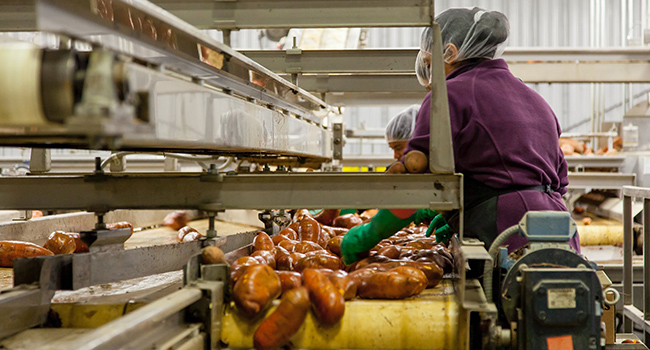 Consumers got a glimpse of how food supply chains work – or don’t – at the beginning of the COVID-19 pandemic. Now Walmart is giving them a chilling new perspective.
Consumers got a glimpse of how food supply chains work – or don’t – at the beginning of the COVID-19 pandemic. Now Walmart is giving them a chilling new perspective.
The sight of empty shelves in grocery stores is certainly a strong indicator at the retail level that something is amiss upstream. Reasons at the start of the pandemic varied from product to product and region to region.
Supply chain management is complicated, obscure and, quite frankly, a tad boring for most. Empty shelves had many interested but only for a while.
Now that things are sort of back to normal, concerns about food procurement are a thing of the past, even as we see a spike in COVID-19 cases.
During the panic-buying phase in the early spring, few experts in the food industry would have predicted the unprecedented levels of vertical co-ordination and incredible support food companies offered to one another. Everyone worked for one shared purpose.
Before COVID-19, things were tense between processors, grocers and farmers. But it was particularly brutal between processors and grocers. Grocers delivered constant unilateral notices through fees and fines. Processors just accepted it, one notice after another. This industry-wide practice has been going on for years.
However, a recent decision by Walmart may be the last straw.
Walmart Canada announced in July that it will require more than 3,000 Canadian suppliers to finance its expansion by charging extra fees for every shipment. Walmart argues that its strategy is about helping consumers save.
In addition to some standardized fees, some items must be delivered in their entirety on the correct date 75 per cent of the time. If items are late or missing during a one-month period, the processor will be fined three per cent of the value.
Your truck is stuck in a snowstorm?
Tough luck.
Even early shipments will incur a fine of three per cent of the value.
New fees could jeopardize the profitability of many Canadian food processors. Of the 3,000 suppliers on Walmart’s list are some multinationals. But there are also several small and medium-sized, family-owned companies trying to keep jobs in rural communities across the country.
Food manufacturing is dying a slow death. The sector has lost 12 jobs a day every day since 2012. And although it’s one of the largest sectors in the country, things may get even worse. We’ve seen recent success stories in parts of the country where new plants have been built, but failures and closures are numerous.
Many factors are contributing to the sector’s demise, the most significant being the ailing co-operative spirit between grocers and vendors.
Undermining food manufacturing is to deny the agri-food sector its strategic foothold. Innovating and growing an economy, especially in rural communities, becomes more challenging.
Recent economic studies suggest that seven jobs can be added just by creating a single food manufacturing job. That ratio is unmatched by any other sectors of the food supply chain.
Growing your own food is a good start but without processing, a nation’s food security remains highly vulnerable. Over time, consumers will pay a hefty price for their nation’s inability to process its own agricultural commodities. With less processing, uncontrollable factors like currency wars, embargoes and tariffs will threaten our food security, one way or another.
Walmart and others can try all they want to make us save, but less procurement control will eventually lead to extremely volatile – and likely higher – retail prices.
The companies that mostly dictate how and what we eat are grocers. Processors and farmers have little say in what Canadians eat.
But that may change, partially due to COVID-19. E-commerce is providing processors with broad access to consumers. And many companies have pivoted in that direction in recent months, avoiding the oligopolistic nature of Canadian food retailing. Wholesalers like Sysco, Gordon Food Service, PepsiCo Canada, Saputo and many more are either doing it or considering it.
Just five companies sell 80 per cent of all the food Canadians eat: Loblaws, Sobeys, Metro, Walmart and Costco. They have great power but protecting food manufacturing has never been a real priority for them even though they say it is.
A more democratized supply chain would cause food companies to share more with the public in the exchange of precious information about the market and future trends. As grocers try to get a better sense of what the after-COVID-19 market will look like, processors are contemplating options to get to us.
Walmart is making the life of food manufacturers miserable because it can. The food manufacturing sector has no voice and is rarely given any attention by governments, starting with the federal government.
If COVID-19 failed to change anything, there’s little hope.
There is, however, one solution. To counter abusive behaviour by grocers, establishing a publicly-sanctioned code of conduct for grocers should be considered.
Dr. Sylvain Charlebois is senior director of the agri-food analytics lab and a professor in food distribution and policy at Dalhousie University.
Sylvain is a Troy Media Thought Leader. Why aren’t you?
The views, opinions and positions expressed by columnists and contributors are the author’s alone. They do not inherently or expressly reflect the views, opinions and/or positions of our publication.
